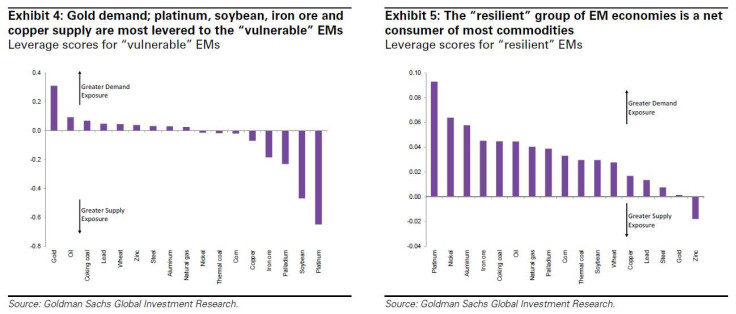Emerging Market Unease Could Upset Global Natural Resources: Goldman Sachs

Emerging market unease from countries with high deficits in early 2014 could have knock-on impacts on natural resource markets, according to Goldman Sachs Group Inc. (NYSE:GS) research.
Gold, platinum, copper, iron and soybean markets could all be rattled by unease within “vulnerable” countries, which the investment bank defined as those with problems managing trade deficits.
From this lens, vulnerable nations include Argentina, Brazil, India, Indonesia, Turkey, and South Africa, Goldman Sachs commodities analysts said in a note from Wednesday.
“Commodities most exposed…include gold on the demand side, and copper, iron ore, soybeans and platinum on the supply side,” they wrote. “This reinforces our existing bearish forecasts on these markets."
The note reinforces the globalized nature of natural resource prices and trading. India is a key source of gold demand and imports heavily. South Africa produces most of the world’s platinum and hosts a community of investors keenly interested in the metal. Brazil is close to overtaking the U.S. as the world’s top soybean producer.
Weaker currencies and slower growth in these countries, among other vulnerable groups, could hurt demand and impact supplies. Those five disparate commodities were the most highly levered to vulnerable emerging markets, on a quantitative Goldman analysis.

Oil is expected to remain insulated from emerging market turmoil for the time being, though.
“We find that the oil market has only a small leverage to this “vulnerable” EM [emerging markets] group given its very low price elasticity. This, along with record low seasonal crude inventories at the end of 2013, is likely a key reason why oil has been so unresponsive to the recent EM turmoil,” wrote the analysts.
Luckily, many “resilient” emerging markets consume commodities in good measure, which could help rebalance global oversupplies.
Investors worldwide have been spooked lately by political and economic moves in Argentina and Turkey, as global equity markets faltered weeks after coming off an encouraging 2013.
© Copyright IBTimes 2025. All rights reserved.






















